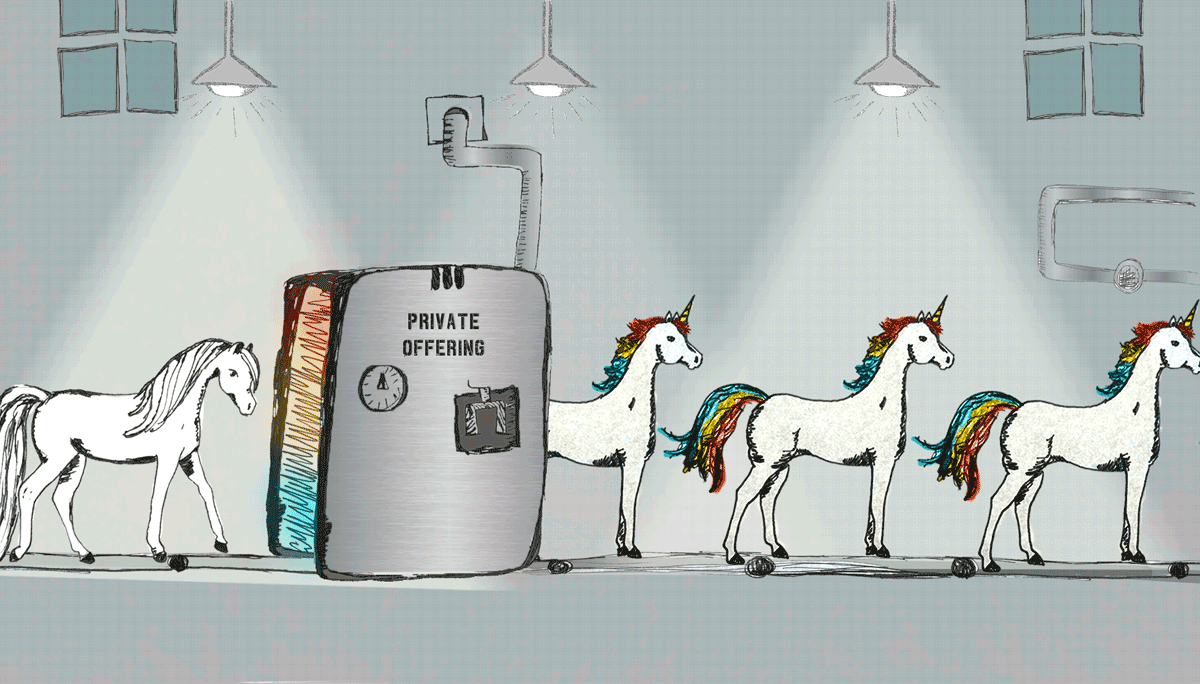The Biggest Myth Isn’t That Unicorns Are Real, But That They’re Rare
Unicorns, once scarce, now number close to 150. A new analysis from McCombs examines how they’ll shake up financial markets as their tally grows.
By Steve Brooks

In their brief corporate lives, the companies Uber and Airbnb have shaken up the worlds of transportation, lodging and big-city politics. Less visibly, though, they’re sending tremors through global financial markets.
With valuations of $62 billion for Uber and $25 billion for Airbnb, both startups have come a long way in a short time. What unsettles investment circles is that they’ve done it completely with private money.
Both are examples of unicorns: financial slang for startups — most of them in tech sectors — that reach estimated valuations of $1 billion without going public. When the term was coined three years ago, such firms were almost as rare as the mythical beasts they are named for. Now, in a groundbreaking census, researchers Keith Brown and Ken Wiles of the McCombs School of Business find the financial forests teeming with them: There were 142 unicorns as of last August, and their combined valuations totaled $623 billion.
“We were surprised to find so many,” says Brown, a McCombs finance professor. “While we were compiling our findings, that number was increasing on a weekly basis.”
38 of the firms surveyed may have manipulated numbersWhat interests him, even more than the size of the herd, is what the phenomenon might bode for the future of capital markets.
“Unicorns are a byproduct of a bigger trend, which is that companies now appear to have the capacity to stay private longer and still grow.”
— Keith Brown
Traditionally, he says, startups have launched with small stakes of private money, from sources like venture capitalists. When it came time for a growth spurt, they raised capital through an Initial Public Offering (IPO).
Firms Don’t Need Public Money
Today, more and more firms don’t need the public. They’re getting significant infusions from private equity funds, in transactions ironically dubbed Private IPOs. Since mid-2014, more technology companies have been funded by PIPOs than (actual public) IPOs. Uber alone has raised four PIPOs worth $1 billion or more.
There’s no single cause for such a massive shift from public to private financing, the researchers say, but one big factor is the size of equity funds themselves. The largest, sponsored by Goldman Sachs, has available capital of more than $20 billion.
“They’re trying to identify companies that can grow quickly, and they’ve got much deeper pockets to invest in these companies,” says Wiles, associate director of McCombs’ Center for Private Equity Finance.
Other pools of money come from institutional investors — a topic Brown knows as an advisor to two investment funds for the state of Texas. To pay benefits like teachers’ pensions, he says, those funds need overall returns of at least 7 percent a year. Since the crash of 2008, they haven’t reliably hit those levels in the stock or bond markets. So they’ve expanded their private equity divisions.
Such mega-funding lets the average unicorn stay private a long time: more than a decade, the study finds, compared to three to five years for traditional startups. Those extra years can give a company a leg up, by avoiding the short-term demands of Wall Street.
— Ken Wiles
“They can continue to grow outside the scrutiny of being a public company,” he says, “with no analyst reports, no forecasts, and no publicizing the details of their operations. They can focus on getting as much market share as they can as quickly as they can.”
Another plus to private over public capital is that it can offer more hands-on governance. “A board of directors with private equity owners on it, who have a high percentage of ownership, is very motivated to help enhance company value,” Wiles says.
That’s not to say that there are no perils in the rise of unicorns. Stock market investors could get shortchanged down the road when a unicorn finally does hold an IPO. That’s because private investors will already have reaped most of the gains from the company’s growth. “Arguably, when they become public, there won’t be as big a spike in price,” says Brown. “They won’t be underpriced to the same extent when they hit the public market.”
Other possible losers are investment banks, which won’t collect as much in underwriting fees when there are fewer IPOs to underwrite. Small-capital mutual funds might suffer, too, because there will be fewer public companies smaller than $1 billion in which they can invest.
But the biggest danger might be to unicorns themselves: the temptation to inflate their worth to achieve that coveted status. “In baseball, there’s a big psychological difference between hitting .300 and hitting .298,” Wiles says. “It is a big deal to become a unicorn. It helps attract good talent to your company.”
He notes that 38 of the firms he surveyed have estimated valuations of exactly $1 billion. That suggests that some may have manipulated their financing terms to hit that target.
Chasing Unicorns
Such manipulation is not uncommon, Wiles explains. Unlike a public company whose value is set by stock markets, valuations of private firms are negotiated between a company and its investors. In exchange for a higher valuation, the newest investors sometimes get preferred terms, like the ability to pull their money out ahead of other investors. If a unicorn stumbles, that means earlier investors could be left holding a much smaller bag.
Compounding the perils is the question of whether too much money is chasing unicorns, pushing their valuations too high to sustain. Brown hesitates to call the situation a bubble, but says it has similarities.
“I’m concerned that a lot of this activity is being driven by the fact that there’s a lot of money available to be invested in this space,” he says. “The market seems a little flooded with funds. I don’t think every institutional investor is going to get the outcome they’re hoping for.”
Since the species is so new, only time and further research can answer such questions, Wiles says. “Are they capturing more market share?” he asks. “Are they dominating their markets? Are they delivering for their investors? Our next research topic will be to see how these companies really perform over the next few years.”
Recently, Uber investor and Silicon Valley venture capitalist Bill Gurley, MBA ’93, spoke with McCombs magazine about what the future holds for unicorns and those that supply private capital. Read the interview online.
This article originally appeared in Texas Enterprise, an online publication from the McCombs School of Business at The University of Texas.


